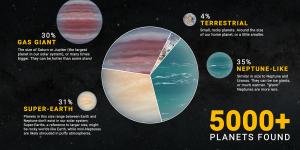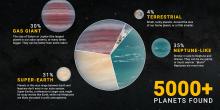5,000 Planets [1]
[AUDIO: exoplanet sonification]
That sound represents the first confirmed exoplanets — planets that orbit stars other than the Sun. At the end of 1992, only two such planets were known — orbiting the dead heart of an exploded star. The first planets orbiting a star similar to the Sun were announced in 1995.
By last spring, the number had passed 5,000, with thousands more possible planets awaiting confirmation. NASA put together an audio track as a timeline of all the discoveries. Each note represents a confirmed planet, with the pitch representing the planet’s distance from its star.
The pace of discovery really picked up in 2009, with the launch of the planet-hunting Kepler space telescope. It found thousands of planets that astronomers have confirmed with additional observations, and thousands more that they’re still trying to lock down. And although Kepler shut down five years ago, it still accounts for a majority of the planets discovered to date.
A successor, known as TESS, has discovered hundreds more, and is still scanning the skies. So are other telescopes in space and on the ground — adding to the “music of the spheres” — exoplanet style.
Script by Damond Benningfield
Keywords:
- Exoplanet [3]
- Kepler Mission [4]


